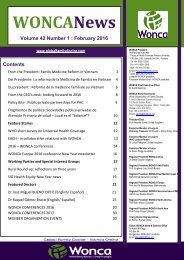You also want an ePaper? Increase the reach of your titles
YUMPU automatically turns print PDFs into web optimized ePapers that Google loves.
DEMENTIAdementia: DIAGNOSISDr • Ensure a doctor confirms the diagnosis of dementia. Consider dementia in the patient who for at least 6 months:--Has problems with memory. Test by asking patient to repeat 3 common words immediately and then again after 5 minutes.--Is disoriented for time (unsure what day/season it is) and place (unsure of shop closest to home or where the consultation is taking place).--Experiences difficulty with speech and language – unable to name parts of the body.--Struggles with simple tasks, decision making and carrying out daily activities.--Is less able to cope with social and work function.--If patient has HIV, has difficulty with coordination.Assess When to assess Notedementia: ROUTINE CAREAssess the patient with dementiaSymptoms At diagnosis, every visit • Check for new symptoms and manage as per symptom pages.• If recent change in mood, energy/interest levels, sleep or appetite, consider depression and refer. Assess risk for self-harm 49.• If patient has hallucinations, delusions, agitation, aggression or wandering refer to psychiatrist.Vision/hearing problems At diagnosis, every visit Manage poor vision or hearing with proper devices.Nutritional status At diagnosis, every visit Ask about food and fluid intake. Arrange nutritional support if BMI < 18.5.Cardiovascular disease At diagnosis Assess CVD risk 68. Ask about previous stroke/TIA, chest or leg pain.HIV At diagnosis • HIV-associated dementia may improve on ART. If status unknown, test for HIV 60.• If HIV give routine care 61 and test for coordination problems: with non-dominant hand as quickly as possible (allow patient to practice twice):--Open and close the first 2 fingers widely.--On a flat surface, clench a fist, then place palm down, then on the side of the 5th digit.Syphilis At diagnosis Refer the RPR positive patient with dementia.Thyroid At diagnosis Refer if result is abnormal.Advise the patient with dementia and his/her carer• Discuss what can be done to support the patient, carer/s and family. Identify local resources, social worker, counsellor, NGO, helpline back page.• Discuss with carer if respite or institutional care is needed. Advise the carer/s to:--Give regular orientation information (day, date, weather, time, names)--Plan daily activities that assist the person to be independent.--Try to stimulate memories with newspaper, radio, TV, photos.--Remove clutter in the environment.--Use simple short sentences.--Regulate fluid intake to deal with incontinence.--Avoid changes in routine.--Maintain physical activity.Treat the patient with dementia• HIV-associated dementia often responds well to ART 61.• Treat aggressive or violent behaviour towards self or others 50.• Treat agitation, distressing behaviour, psychotic symptoms with haloperidol 0.5–1mg up to twice daily.86MENTAL HEALTH



